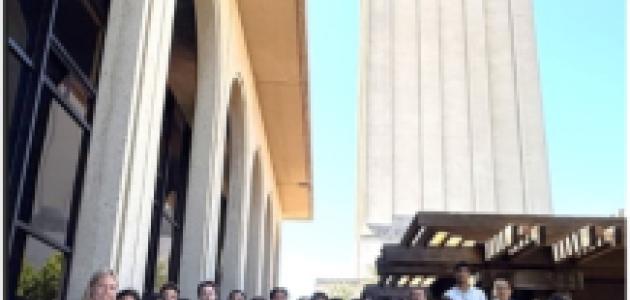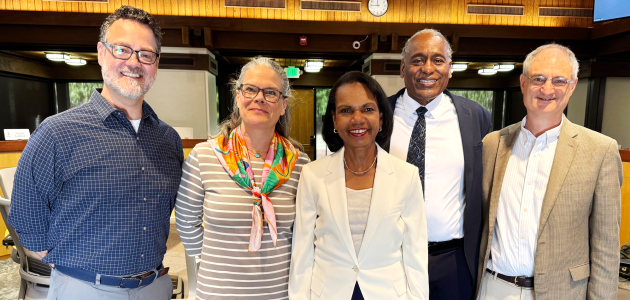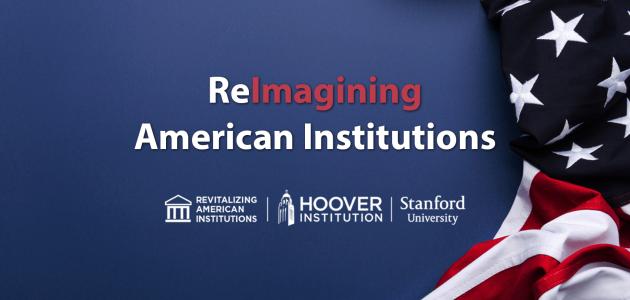In this edition of The Hoover Institution Briefing on Reforming K–12 Education, Hoover experts host senior education leaders from several US states to discuss topics including chronic absenteeism in schools, the limit of First Amendment protections in schools, and school district election dynamics. Also, Thomas Dee reveals that coordinated immigration enforcement raids in California’s Central Valley in January 2025 depressed school attendance for months afterwards. And Eric Hanushek and Macke Raymond discuss new evidence supporting the use of pay-for-performance models for teachers in K–12 education.
Featured Analysis

Hoover Experts Discuss Pressing Challenges with State Education Chiefs
State education secretaries from across America, along with representatives from the Council of Chief State School Officers, joined Hoover fellows on May 15 and 16, 2025, for a series of topical briefings with a focus on how to reinvigorate K–12 education.
The gathering is part of a series of events put on by Hoover’s State and Local Leadership Forum, organized in part to conduct outreach with legislators at the federal and state level as well as municipal and education sector policymakers and public servants.
The goal is to equip decision-makers with the latest scholarship as they deal with a myriad of challenges facing the sector in the wake of the COVID-19 pandemic and its related disruptions to learning.
At the forum, Hoover Institution Director Condoleezza Rice was first to address the state education leaders, speaking about her lifelong work as a scholar and educator and her time serving in the George W. Bush administration as national security advisor and secretary of state. She emphasized the need for US K–12 education policy to reflect the needs of all American children and stressed that they should have access to high-quality schooling.
Also presenting for the education leaders were fellows Margaret (Macke) Raymond, Eric Hanushek, Thomas Dee, Michael T. Hartney, Eugene Volokh, and Natalie Millar.
Read more here.

What DC and Dallas Are Proving about Teacher Salaries
At Education Next, in a reprint of a piece published last month at The Washington Post Opinion page, Distinguished Research Fellow Macke Raymond and Senior Fellow Eric Hanushek raise “the disquieting fact” that in many school districts across the country, teacher salaries are “virtually unrelated to effectiveness in the classroom.” After highlighting successful performance-based pay reforms in Washington, DC, and Dallas, Raymond and Hanushek consider why more districts have not adopted similar changes. They suggest that the American school system “is both compliance-based and a fierce defender of existing personnel and operational structures.” More spending alone has not improved outcomes, so the authors call for “extensive change” requiring “new thinking by the states, which already have considerable flexibility that has gone largely unused.” Above all, the piece argues for a reexamination and removal of “the constraints on performance that have grown to envelop our schools.”
Read more here.

Immigration Raids in Central California Increased Student Absences for Months: Study
A new study reveals that immigration raids in early 2025 resulted in a 22 percent increase in daily student absences in central California communities that lasted at least two months.
The research, conducted by Thomas Dee, analyzed attendance data from five school districts in California’s Central Valley where unexpected immigration raids occurred in January 2025.
It found that the enforcement actions, dubbed “Operation Return to Sender” by US Customs and Border Protection, had immediate and statistically significant consequences for school attendance. The impact was particularly pronounced among the youngest students, with pre-kindergarten children showing a 32 percent absence rate, even higher than the overall average of all K–12 students.
Dee examined daily attendance records spanning the current and two previous school years in five Central Valley school districts to establish a connection between raids, which began on January 7, 2025 (prior to Donald J. Trump taking office), and the absences.
The study suggests that parents’ fears of being separated from their children during immigration enforcement actions led many families to keep their children home from school. This trend raises concerns about educational disruption, increased childhood stress, and diminished learning opportunities for affected students.
Read more here.
Highlights

Which Is Worse: Sugary Snacks or Bad Schools?
As Republican governors in a number of states move to exclude purchases of candy and soda from the Supplemental Nutrition Assistance Program (SNAP), Senior Fellow Chester E. Finn, Jr. asks at the Flypaper blog whether “awful schools and fraudulent providers” will similarly be excluded from federal tax credits and state-level tuition voucher programs. Noting that some in the “libertarian wing” of the school-choice movement oppose “quality-control regulation” to vet the schools and programs that receive public education subsidies, Finn replies that “states and their leaders have an obligation” to ensure that education dollars advance the public purpose of producing an educated society. Finn shares his preference that only high-quality schools be eligible for public funds but acknowledges how this “edges into nanny state territory and may discourage the innovation and dynamism that K–12 education sorely needs.”
Read more here.

Civics Ceasefire
On a recent episode of Intellections, Finn illustrates the challenge facing educators working to improve civics education in US schools today. Just more than a fifth of US eighth graders are considered proficient in civics. And even decisions around what should make up state civics curricula become pitched culture war battles. The answer is to let individual states set new civics standards. Some already have, with a number of states instituting a test akin to the US citizenship test that all high schoolers must pass to graduate. “Whether a citizenship-based test, a new curriculum, or something else, the first steps forward are the most important to put cultural and political conflict aside, build upward from parental consensus, and return to civic fundamentals, to re-instill faith and pride in what it means to be an American,” the video states.
Watch the video here.
You can read more commentary from Finn on the imperative need for civic education here.
Listen to or watch Finn’s five-part limited podcast series on civic education renewal here.

Support for Testing and Accountability Is Waning. Is Politics to Blame?
Writing in the Opinion section at The74, Hoover Fellow Michael T. Hartney examines the consequences of voters “following the leader” in national education policy. As he explains, political science literature supports the idea that voters often embrace or reject “policies championed—or opposed—by elites in their political tribe.” In education, Hartney says, shifts among the Democratic Party’s leadership on school accountability and standardized testing have driven down rank-and-file support for the use of standardized tests to measure student achievement. While support has dropped over the last twenty years among Republicans too, the swing is larger among Democrats. Hartney suggests that the concurrent embrace of teachers’ unions by the Democratic Party helps to explain the change. As he concludes, “Testing and accountability became less popular among Democratic voters after the party’s elected officials and their powerful labor partners firmly united publicly against these positions.”
Read more here.
Spotlight: HESI’s Practitioner Council

The Practitioner Council of the Hoover Education Success Initiative is comprised of 20–25 leading education policy voices from across the country. Collectively they serve as brain trust advising the HESI team on ways to maximize the impact of Hoover’s education research. Each member occupies a unique space in the education system—sitting inside Governors’ offices or serving in state legislatures or on state boards, or leading state education agencies, local school districts, educational non-profits, and advocacy groups.
For more insight on important educational issues visit www.hoover.org/focus-areas/reforming-k-12-education





















